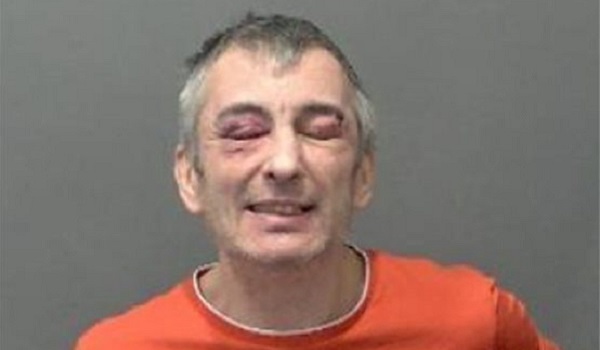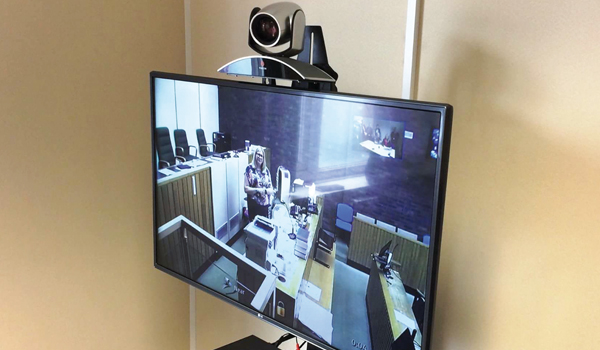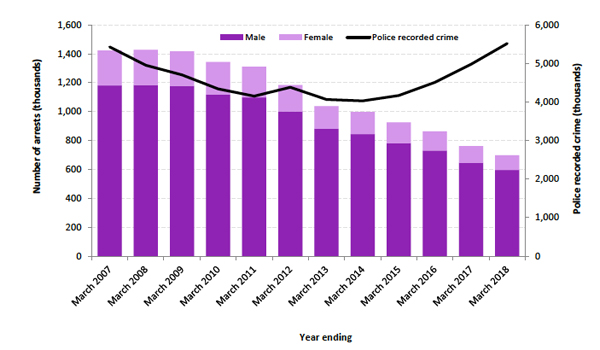Rape victims being ‘continually and systematically failed’, report finds
Rape victims are being “continually and systematically failed” by the criminal justice system, a scathing root-and-branch joint inspection by HM Inspectorate of Constabulary and Fire and Rescue Services (HMICFRS) and HM Crown Prosecution Service Inspectorate (HMCPSI) has found.
The report found it took an average of nearly two years (706 days) between reporting an offence to police and the start of a criminal trial and inspectors highlighted a lack of collaboration between the police and prosecutors, and poor communication with victims – including minimal updates about how their cases were progressing.
One case took 16 years to reach court due to “an apparent lack of evidence”, despite the presence of DNA at the scene.
Wendy Williams, HM Inspector of Constabulary, and Andrew Cayley QC, HM Chief Inspector of the Crown Prosecution Inspectorate, said: “Rape victims are continually and systematically failed by the criminal justice system.
“We found many hardworking professionals who are dedicated to supporting victims and pursuing perpetrators, but we also found some deep divisions between the police and prosecutors which must be overcome.”
The report made a number of recommendations, including creating either temporary or permanent specialist rape courts within the next three months to help clear the case backlog.
It also suggested the police and the CPS should work together to ensure that a defendant’s “bad character” is considered in all rape cases, and progressed wherever it is applicable, amid anecdotal evidence prosecutors and investigators were often missing opportunities to present such evidence before the courts.
The report examined 556 files from the police and the CPS, evidence from interviews, and survey responses from 135 survivors and victim support services.
It echoed the long-held concern that victims often felt they were the ones being investigated or standing trial, rather than the focus being on the accused.
Others said they felt “angry and let down” after not being contacted by the police or the CPS at the conclusion of their case.
The Government apologised following the publication of its long-awaited Rape Review last summer, and said it aimed to reverse its dire record on serious sexual offending, which has seen convictions plummet.
Max Hill QC, the Director of Public Prosecutions, this week acknowledged there was “a crisis of public trust” over how the criminal justice system deals with rape and sexual assaults.
Responding to Friday’s report, he said: “We are undertaking extensive work to bring about urgent change and to improve the support given to victim. Working with support services we will improve communication and better understand how we can help victims through the legal system so they can give their best evidence.
“Strong collaboration between prosecutors and police is vital, and we have a strong joint commitment to improve how we work together so that we can drive up the number of rape cases we bring to court.
“We accept the findings of this report and will make sure we are providing the compassionate, consistent care that victims rightly deserve.”
Chief Constable Sarah Crew, the National Police Chiefs’ Council’s lead for adult sex offences added: “We understand change isn’t happening fast enough, but this is an opportunity to bring about real and sustainable change to the handling of these traumatic offences, to transform the victim experience and bring more perpetrators to justice.
“We are committed to transforming the police approach to rape and serious sexual offences and ensuring that victims get the service, support and outcomes they deserve throughout the criminal justice process.
“We recognise there is still much to do, and work is well underway to improve the policing response, including through the Soteria Bluestone programme. This is a unique and innovative collaboration between police and leading academics to develop a new evidence-based and transformational approach to the investigation of rape.
“We welcome the recognition in the report of the progress the programme has made so far. The learning phase is well underway in pathfinder forces, with insights from these being shared across policing. Insights from this programme are also being shared with the Crown Prosecution Service and we are reviewing our joint National Action Plan, which provides the framework for the joint improvement around cases of rape and serious sexual offences, based on this learning.”
Figures released earlier this year showed that in the 12 months to September 2021, only 1.3 per cent of the 63,136 rape offences recorded by police resulted in a suspect being charged.
Friday’s joint report acknowledged the good work of “many dedicated and hardworking police officers and prosecutors committed to the investigation and prosecution of rape” amid sometimes “overwhelming” workloads.
But its overriding finding was of a system in need of widespread reform.
The report also included testimony from rape survivors, who described their arduous wait for justice.
One survivor told the report investigators: “It was ridiculous how long it took. He was out there drinking around females. He was able to go abroad on holidays.
“I thought, how is it that I am here, I am financially ruined, I am severely traumatised and barely keeping it together, and yet the system allows him to just go off and do what he wants?”
Claire Waxman, London’s Independent Victims’ Commissioner, said: “The report makes abundantly clear what we have known for a long time – that regular communication with victims is key, but that justice agencies are simply failing to do this and meet victims’ needs.”
In October the Government pledged to increase annual funding for Ministry of Justice victim support services to more than £185 million by 2024/25 – an 85 per cent increase on funding in 2019/20, while an additional 115 prosecutors have been trained in how to deal with rape and sexual assault cases.
There are an estimated 128,000 victims of rape and attempted rape a year.
The Victims’ Commissioner for England and Wales, Dame Vera Baird QC, said: “As a society, we expect that victims of one of the most appalling crimes will be treated with dignity and be able to access justice. The report today shows that this is far from the experience of many rape victims. As the authors of this report readily acknowledge, many of their arguments are by now well-rehearsed, having been previously aired and repeated to little effect. I echo their renewed calls for those who lead our criminal justice agencies to bring about urgent and drastic improvements, and I welcome the report’s new, substantive recommendations.
“This starts with a radical shift in culture to suspect-focused investigations and prosecutions, whilst ensuring victim-centred engagement. The CPS stand judged of failure to build strong cases and for unacceptably poor communications with victims. Certainly, the CPS is a long way away from where it claims to be. In striking examples, prosecutors are found to miss or disregard opportunities for applications to have the defendant’s bad character put before the jury and many prosecutors seem to find the crucial task of engaging with victims beyond them. Such disregard profoundly impacts victim confidence and the prosecution’s failure to build strong cases results in fewer and fewer convictions, as the statistics make only too clear.
“Justice delayed is often justice denied. We know that court delays exert a huge psychological toll on victims and the stress and uncertainty of years-long waits for justice is driving many to drop their claims altogether. Faced with such challenges, it’s vital that justice for rape victims is prioritised. I welcome proposals for specialist rape courts to help clear the Crown Court backlog of rape cases. This needs to be staffed by specialist judges and lawyers and accompanied by the rapid rollout of pre-recorded video evidence and cross-examination (Section 28).
“Over the past year we have seen many such reports come and go, often treading much the same, familiar ground. We are now not short on recommendations. Ultimately, the problems in investigating and prosecuting rapes are plain and clear and it is drive and leadership to bring fundamental change on the ground that is now urgently needed.”
The Association of Police and Crime Commissioners joint victims leads, Donna Jones and Sophie Linden, said the report “makes for grim reading for those who have been brave enough to come forward and report this life-changing crime”.
Commenting on the report they said: “It is appalling that the system is still failing rape victims, leaving them traumatised whilst they wait for justice to be done. Communication is key to making victims feel their voices are being heard and plays a huge part in encouraging and supporting them to stick with the criminal justice process. We are dismayed that the findings of the report have concluded that communication with rape victims post-charge is ‘frequently disjointed and contradictory, and sometimes didn’t take place at all’.
“Victims should be at the heart of the criminal justice system. We welcome the recommendation of HMICFRS for immediate improvement required by police and prosecutors to significantly improve communication with victims. This is clearly in line with Victims’ Bill. The victim should choose how they are updated, when and by whom and all parties in the system must improve communication and working practice to ensure this happens.”
Ms Jones added: “Sadly, the findings of the HMICFRS report are not a surprise. The CPS needs to radically overhaul its approach to charging, not just RASSO cases but all crimes.
“If the CPS are serious about speeding up the length of time for a rape case to get to charge and court, they need to put the additional prosecutors they have recruited into major custody suites across the country. This will have a significant impact in improving file management and strengthening relationships between the police and the CPS.
“Furthermore, there is an urgent need for a data sharing agreement to be signed between the CPS and forces across the country to massively speed up the charging decisions. The delays in charging is one of the biggest factors of victims withdrawing and deciding not to proceed to justice. This must be addressed urgently.”
Andrea Simon, director of the End Violence Against Women Coalition (EVAW), said: “We’re pleased to see the police and CPS inspectorates echoing our calls for transformation in how the justice system treats rape. For too long, survivors have faced appalling treatment when reporting rape – not being believed, being retraumatised throughout the justice process, and ultimately not seeing a conviction.
“However we would expect to see the inspectorates take a systemic approach to resolving these deeply rooted issues within the CPS. The culture of the institution needs to transform with strong leadership, accountability and a commitment to changing the attitudes and practice driving these failures.
“In the decriminalisation of rape report, EVAW and our partners outlined clear actions that must be taken to rebuild our broken justice system. This includes an in-depth review of CPS governance, legally qualified advocates for victims in rape and sexual abuse cases, a review of the courtroom cross-examination rules and a commissioning model that funds Rape Crisis centres and specialist support services led ‘by and for’ black and minoritised survivors. We urge government, the CPS and police chiefs to take urgent action to radically transform their approach to rape.”
Jayne Butler, chief executive officer, of Rape Crisis England and Wales, said: “Rape Crisis England and Wales have spoken extensively of how catastrophic failures within the criminal justice system are impacting rape victims and survivors, and this report, as well as the many other reports that came before it, further evidences the depth of the issue. Throughout the police, CPS and court system, victims and survivors are facing ineptitude, indifference and misogyny. The situation is unacceptable, and immediate action is needed.
“We support the recommendations set out by the inspectorates and commend the amount of work and level of detail that has gone into this report. If actioned, these could transform how victims and survivors experience the justice system. However, we now require an in-depth review of CPS Governance in order to hold such poor performance to account and prevent such a scandalous drop in rape prosecutions happening again.”
Harriet Wistrich, director of the Centre for Women’s Justice, added: “This is yet another report which identifies the parlous state of criminal justice in relation to the prosecution of rape. This crime is virtually decriminalised and rapists are free to offend and re-offend. The report makes a series of urgent recommendations for the police, the CPS and government, which we welcome. However, as we recommended in our partnered report, on decriminalisation of rape there needs to be accountability particularly of the CPS which has led the trend in collapsing prosecutions and failed to reverse it.”







